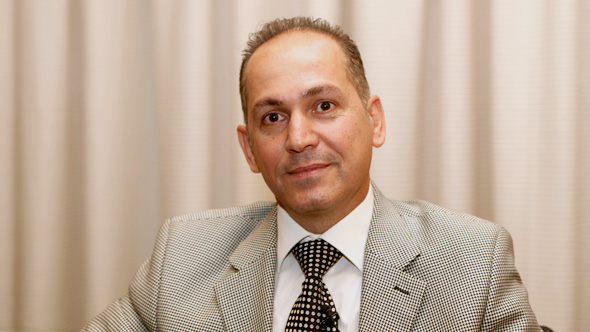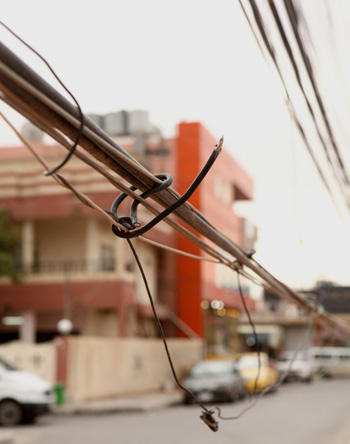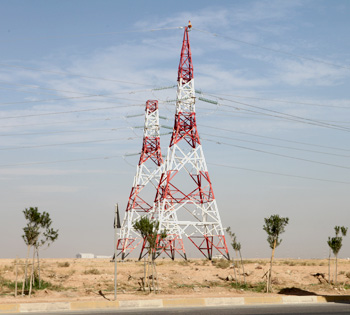Electricity in Kurdistan: Power Distribution Projects
Iraq, including the Kurdistan Region, requires an enormous amount of materials which are currently still being shipped in or transported by trucks into the country. The country still represents only a workshop for installation – and it will remain so until there are new factories established which will cater for the local demand. Regarding the electricity consumption, the government is unable to anticipate the growth and thus is always behind the demand.

Kurdistan is on the forefront of electricity development. There are 20-24 hours of electricity per day in Erbil while in the main part of Iraq there is still less even though they spend more money on the development. What is happening in Erbil is a sort of a combination of public-private partnerships in order to develop the electricity system. In your opinion, what is the general state of the sector in terms of electricity, power generation etc.?
All of Iraq has a large need for electricity and there is still a really big difference between demand and availability. It is not only power plants; it is also the distribution sector. If you have a power plant, you need the distribution sector, substations and networks for new areas. There is also a need for networks in old areas and many updates are needed. Kurdistan is one or two steps ahead of other parts of Iraq. As we are hearing from the media, Kurdistan is now also supporting cities like Kirkuk and Mosul.
I would like to talk about the situation in Erbil in particular. There is much activity in electricity, power plants, substations and networks. For example, I am representing Civelec and we are very active in this field. I can tell you that 20 to 25% of networks (substations) is filled by Civelec and our partner company Bekhma. There is still a need for new systems and new projects because Erbil is booming and there are so many new projects, new buildings, new hospitals and so on.  They all require electricity and the networks require underground cables. We are now working on these projects and there are always new feeders going to the right and left. So this is our main activity and the requirement of the people.
They all require electricity and the networks require underground cables. We are now working on these projects and there are always new feeders going to the right and left. So this is our main activity and the requirement of the people.
In terms of the electricity consumption, by how much is the demand growing per annum?
I can’t give you exact figures but we can see that the government is always behind the demand. For example, they are in need of 1,000 MW but the requirement will be 2,000 MW or more because you cannot always anticipate the growth that will occur. Also, there are always new villages and new individuals asking for electricity, new roads and new construction. Every day, there are new tenders in the Erbil governorate, which is the focal point for tenders. Most of the companies are daily following the tenders and projects in this governorate.
Altogether, the result is that companies can take part in the tenders and receive projects. It is busy but to be honest, the beginning of 2012 and earlier was much better than it is now. There have been less projects as for the second half of 2012. We don’t know the reason for this decrease but it could be the political situation between the Kurdistan Regional Government (KRG) and the Central Government. Also, there is the Syria issue and the economic blockage of Iran, both of which are closely related to us because of our geographical proximity.
Despite this decrease, Iraq and Kurdistan in particular is a very healthy environment for business. There are always new projects, and money and support are available from the government, as well as security which is the main issue for this area. Personally, I travel a lot to Europe, the other Arab states and our neighbors and I think you cannot compare their security to the security in Kurdistan. The counters are changing money on the street which you would not see in Europe or most parts of the world. There are very young guys who deal with a few hundred thousand US dollars and keep on changing currencies on the street.
If you just calculate how many trucks are entering Iraq and what is being shipped in, you can come to an understanding of the huge requirement for materials. As I told you, Iraq is now just a workshop for installation.
We also have an investment law. There are some points in our investment law that you do not find in many countries. For example, investment is supported strongly by the government and the main point is that investors can own the land which is given to them by the government. They are offering land which later the investor can own without any local partners. You do not see that even in the Gulf countries like Dubai, or Kuala Lumpur in Malaysia or other countries. This is a very new and modern law and investors can get guarantee for their projects because they have land registered in their name without local partners. There are many opportunities for businesses and big companies in different fields such as oil, gas and transportation. For example, we have no metro line or railway and there is a need for highways between cities and towns. These are all things that investors can think about.
You mentioned that activity is now slowing down. Do you mean the tendering activity or the demand for electricity?
The tendering activity. Both local and international investors are in a studying period. They are just watching the situation. We know this because we are in close contact with many companies who are interested in starting businesses or have opened branches here. But due to circumstances such as political conflicts or local news, they are hesitating. But it is just a comparison between the second part of 2012 and the first part of 2012 and earlier. We now see that things are going a little bit slower than before. We hope that next year many of these conflicts will be settled down and things will start to move as before.
Let’s talk about the company itself. Can you describe your activities, your challenges, your strategy and why you are the ideal partner for joint ventures with foreign companies?
As a local company, we have a stake in working with the local people and supporting each other with the government. We are looking forward to getting involved in increasingly bigger projects. I think until now we have succeeded with this as our aim. The only difficulties we are facing are the difficult loan procedures from the government. We are suffering from the bureaucratic issues and the difficulty of getting our payments from the government. There is not just one committee. There is committee one, two, three, four and five. In case of some of our documents, we need more than 50 or 55 signatures for one payment. First, there might be a committee for installation, for example. There’s a second committee for checking and supervising the first company for quality control of materials. Just the quality control requires at least five or six people. Then there are another five or six engineers required for supervision and also later, you have another committee for the handover. This gives us three committees beside the general directors, deputies, ministry, governor, and deputy. That means you have some side committees if it’s related to the municipality or water department or some other department. This adds up to about 40 to 45 people and you have to collect all the signatures for a payment.
Second, because they are implementing different projects close to each other – water beside electricity beside road beside bridge – sometimes there is no understanding between the ministries and departments. For example, today you have a cable project and tomorrow there’s a pipeline beside this cable. The next day there’s a new road construction and you have to remove the pipeline to make the road construction. It happens because of the lack of mutual understanding or the lack of experience and it really makes our work burdensome. It is normal though for an area like Kurdistan because everyone is in a hurry to finish projects and when you are in a hurry you will face these types of difficulties. In comparison with our neighboring countries like Iran, Syria or even some parts of the Gulf area, our area is very active, very healthy and we have very good people supporting each other. Kurdistan represents a very healthy environment for business right now.
Regarding the business environment, as a private sector company – what is your take on how difficult it is to do business in Kurdistan?
You also mentioned your foreign partners are sometimes a bit hesitant to enter the market. Is that because of problems related to bureaucracy?
Bureaucracy is one of the main issues, as well as the banking system. To build a company and support local companies, it is very important to have a banking system to handle the projects and companies. Unfortunately, we still don’t have a banking system. We have banks but not a banking system. Once we have a banking system, we can make links to Europe and other countries. The benefit rate of banks is unbelievable compared to other countries. For huge projects, you cannot deal with cash. You need the whole banking system. Also, there is a need for insurance. There is still not any kind of insurance system in Kurdistan. There are some insurance companies but as a system, we have no insurance system in Iraq or Kurdistan in particular. This includes personal insurance. This is also a big opportunity for big insurance companies to open up in this area and that’s what we are looking for in terms of support for companies.
In terms of your business development, what is your strategy and your business goals for the short-term and long-term?
We are looking forward to establishing real partnerships with some big companies. We would like to have factories here. Slowly, construction of buildings and roads will reach a maximum point but now in Iraq in general, everyone is depending on the factories beyond our borders. There are currently no factories or production system put in place. Iraq is just like a workshop for different installations. We are bringing materials from different states to install them here.
So we are still missing factories and production lines and we are thus thinking of implementing projects in partnership with international companies to open factories here.
Will these factories cater to the local market or will they also try to export manufactured products?
As a local company, we have a stake in working with the local people and supporting each other with the government. We are looking forward to getting involved in increasingly bigger projects.
Many companies on the Turkish side have already blocked all their products for Iraq for the next one or two years. All lines are working for Iraq. Even if you opened factories now, they would not meet the local demand for the next two or three years. Probably only then you can start thinking about exporting.
There is a huge demand starting from a single cable, conductors, transformers, poles, and panels. It all comes from outside of Iraq. There is still not any kind of electrical materials factory inside Iraq. There used to be a factory for transformers but it is not active anymore.
If you just calculate how many trucks are entering Iraq and what is being shipped in, you can come to an understanding of the huge requirement for materials. As I told you, Iraq is now just a workshop for installation.
Please give us your personal vision. You spoke about things developing too fast and furious. Is the Kurdistan Region the next Dubai?
I think it is too early to talk about that. We hope to grow quickly like Dubai but our area is an enclosed area. We don’t have a sea port or direct contact to Europe or other countries. We are in between countries that aren’t very stable, like Iran, Syria and Turkey, which is quite negative. Dubai doesn’t have these concerns.
You also have to speed up the education process to build all of these construction projects and roads. The government needs to push in this direction and improve education to build an educated society. This is more important than business or anything else.
Some very ignorant people became very rich people and now they are leading very rich and powerful companies, which is also not healthy at all. We hope the government will consider all these issues and compare them to some very modern countries like Dubai.